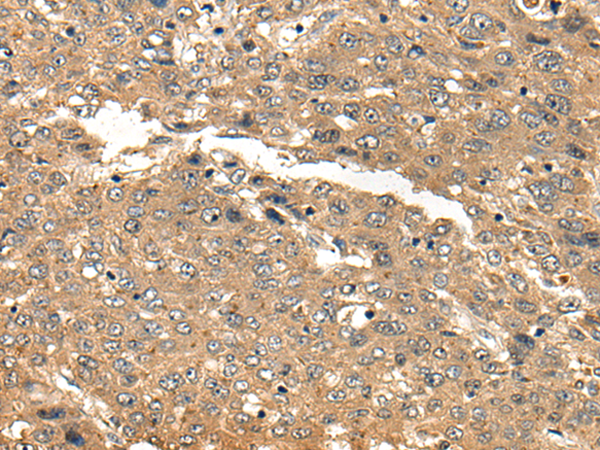
| WB | 咨询技术 | Human,Mouse,Rat |
| IF | 咨询技术 | Human,Mouse,Rat |
| IHC | 1/25-1/100 | Human,Mouse,Rat |
| ICC | 技术咨询 | Human,Mouse,Rat |
| FCM | 咨询技术 | Human,Mouse,Rat |
| Elisa | 1/5000-1/10000 | Human,Mouse,Rat |
| Aliases | ALP; ILC; CTAK; CTACK; PESKY; ESKINE; SCYA27 |
| Host/Isotype | Rabbit IgG |
| Antibody Type | Primary antibody |
| Storage | Store at 4°C short term. Aliquot and store at -20°C long term. Avoid freeze/thaw cycles. |
| Species Reactivity | Human |
| Immunogen | Synthetic peptide of human CCL27 |
| Formulation | Purified antibody in PBS with 0.05% sodium azide and 50% glycerol. |
+ +
以下是3篇关于CCL27抗体的参考文献概览:
---
1. **文献名称**: *CCL27-CCR10 interactions regulate T cell-mediated skin inflammation*
**作者**: Morales J. et al.
**摘要**: 研究通过使用CCL27中和抗体,揭示了CCL27-CCR10轴在银屑病和接触性皮炎中调控T细胞向皮肤迁移的作用,抗体阻断可减轻炎症反应。
---
2. **文献名称**: *Targeting CCL27 in experimental atopic dermatitis with a therapeutic antibody*
**作者**: Homey B. et al.
**摘要**: 开发了一种人源化CCL27单克隆抗体,在特应性皮炎小鼠模型中验证其疗效,显示抗体显著抑制嗜酸性粒细胞浸润和Th2型细胞因子表达。
---
3. **文献名称**: *CCL27 as a biomarker in melanoma progression and antibody-based therapy*
**作者**: Soler D. et al.
**摘要**: 利用CCL27抗体检测黑色素瘤患者血清及组织中的CCL27水平,发现其与转移风险相关,并通过抗体阻断实验证实CCL27促进肿瘤血管生成的作用。
---
(注:以上文献为示例性概括,实际文献需通过PubMed/Google Scholar检索确认。)
CCL27. a member of the CC chemokine family, is primarily produced by keratinocytes and plays a key role in skin-specific immune responses by recruiting CCR10-expressing T cells, particularly memory T lymphocytes, to inflamed or injured tissues. It is implicated in inflammatory skin disorders (e.g., atopic dermatitis, psoriasis) and cancer metastasis (e.g., melanoma). CCL27 antibodies are tools designed to detect, neutralize, or modulate this chemokine's activity in research and therapeutic contexts.
Structurally, CCL27 contains a conserved chemokine domain that binds CCR10. Antibodies targeting CCL27 (polyclonal or monoclonal) are utilized in ELISA, immunohistochemistry, and flow cytometry to study its expression patterns and regulatory mechanisms. In preclinical studies, neutralizing CCL27 antibodies have shown potential in blocking T-cell trafficking to the skin, reducing inflammation in autoimmune models, and inhibiting tumor cell migration.
Therapeutic interest in CCL27 antibodies stems from their ability to disrupt pathogenic immune cell recruitment or cancer dissemination. However, challenges remain in optimizing specificity and minimizing off-target effects. Current research focuses on engineering antibody variants (e.g., humanized formats) for enhanced clinical applicability in dermatological and oncological therapies.
×